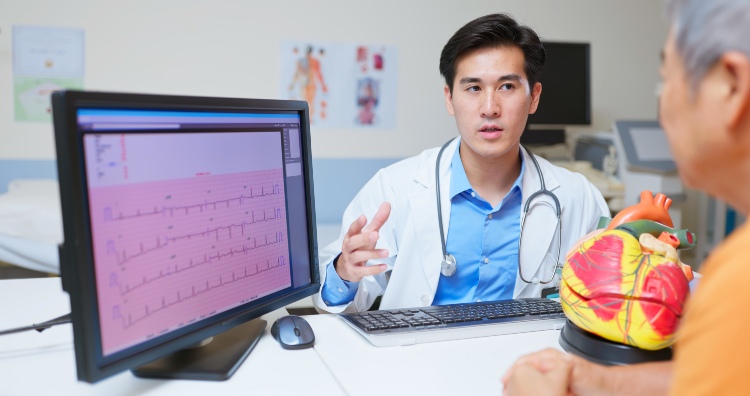Understanding the Various Types of Heart Arrhythmias
Treating Different Types of Heart Rhythm
When you feel excited, scared, or angry, it’s normal to feel your heart race or skip a beat. But if this happens when you’re calm or at rest, it could be a sign of a heart condition called cardiac arrhythmia. There are many types of this condition, some of which can be severe and pose risks to your health. CardioNow treats several types of heart rhythm conditions for patients in Lynnwood, WA and its surrounding areas. Below is a helpful explanation of heart arrhythmia, its health concerns, risk factors, and symptoms, and ways we can help patients alleviate and manage it effectively.
What Is a Heart Arrhythmia?
A heart arrhythmia is a condition that causes an irregular heartbeat or heart rate. It occurs when the electrical signals that coordinate your heartbeats malfunction or improperly work. When this occurs, the heart may start to beat faster, slower, or more erratically than it should. Arrhythmias are often confused with heart palpitations. Though the conditions share similarities, and irregular heartbeats can cause palpitations, they are distinct and should be treated as such. Some forms of arrhythmia are superficial and harmless, while others can be serious or life-threatening. That is why you should seek treatment if you suspect or know you have the condition.

The Types of Arrhythmic Heart Rhythm Conditions
The types of heart rhythm disorders can vary based on the patient’s condition and overall health. Generally, Arrhythmia is classified into the following:
- Tachycardia: When the heartbeat is too fast, or over 100 beats per minute.
- Bradycardia: When the heartbeat is too slow, or under 60 beats per minute.
- Ventricular Arrhythmias: This highly dangerous type originates from the heart’s lower chambers and often requires immediate medical attention.
- Supraventricular Arrhythmias: This type begins in the atria, the heart’s entryway to the lower chambers. It includes Atrial Fibrillation (AFib), the most common cardiac arrhythmia.
What Different Heart Conditions Cause Heart Arrhythmia?
Heart-related conditions that may lead to arrhythmia include the following:
- Coronary Artery Disease (CAD): This condition blocks and narrows arteries. When this happens, the reduced blood flow can interrupt electrical signals.
- Heart Attack: Some heart attacks can damage heart tissue, which can cause the electrical system to malfunction.
- Cardiomyopathy: A disease of the heart muscle that can cause it to become enlarged, thickened, or stiff.
- Heart Valve Disorders: Valve conditions like mitral valve prolapse and stenosis can strain the hearts, causing Arrhythmia.
- Heart Failure: If heart failure damages or weakens the heart muscles, it could lead to irregular or erratic heart rhythms.
- High Blood Pressure: Can weaken the heart over time.
What are the Risk Factors of Heart Arrhythmia?
Irregular heartbeats can be caused and escalated by many risk factors. If you have one or more of the following, we recommend having your heart assessed by a professional cardiologist:
- Age: As we age, our risks of developing an irregular heartbeat increase.
- Family History: If Arrhythmia runs in your family or is genetic, you may be at an elevated risk.
- Lifestyle: Smoking, excessive alcohol consumption, and drug use are all risk factors.
- Other Medical Conditions: The conditions that increase Arrhythmia chances include, but are not limited to, obesity, diabetes, kidney disease, and lung disease.
What are the Symptoms of Arrhythmia?
The common symptoms of irregular heartbeat include:
- Palpitations: The feeling that the heart is racing, fluttering, pounding, or skipping beats. As mentioned above, many people think that Arrhythmias and palpitations are the same, which they are not.
- Dizziness or Lightheadedness: A faint or unsteady sensation that occurs when arrhythmia restricts blood flow to the brain.
- Shortness of Breath: Labored, forced, difficult breathing, or feeling as if you can’t properly catch your breath.
- Fatigue: A sudden and unusually tired feeling, or a bodily weakness that may make you want to sleep or rest.
- Fainting: A sudden loss of consciousness resulting from the brain not getting enough blood or oxygen.
- Chest Pain: Pressure, tightness, or pain in the chest. In severe cases, patients may mistake an Arrhythmia for a heart attack.
Why Choose CardioNow for Your Needs
For many years, we have been the top choice for cardiac treatments and heart healthcare. Cardiac patients choose us because we provide the following:
- Comprehensive Cardiac Services: Our cardiovascular services comprise a wide range of care, including preventative medicine, lifestyle guidance, and coronary artery disease intervention.
- Innovative Solutions: From innovative diagnostics and testing to holistic treatments, we can provide you with the guidance and services you need to thrive in your heart health.
- A Committed, Experienced Team: The team at CardioNow has treated cardiac and heart-related conditions for years. From our first meeting, our dedication will remain unwavering.
Get Treatment for Your Heart Rhythm Disorder
Though some forms of cardiac arrhythmia are harmless, others could indicate an underlying condition like heart disease. Even if yours is benign, you shouldn’t have to suffer from shortness of breath or other uncomfortable symptoms. If you are ready to make a change and relieve your irregular heartbeat, the team at CardioNow is here to help. Take the next step to optimal heart health and schedule your first appointment today. Our board-certified team will assess your heart and develop a customized treatment plan to enhance your health.

